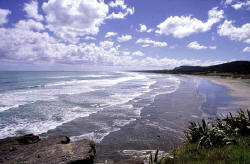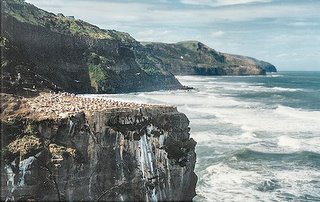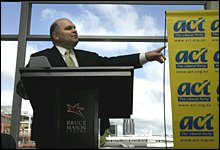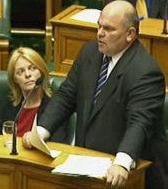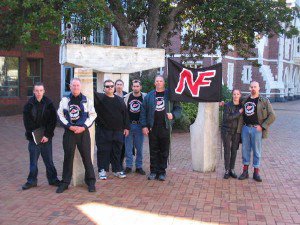With Foreign Minister Winston Peters having returned to the country on Friday -- following his trip to the Apec forum in Korea, where he oddly stated that he was concerned with the decreasing number of Asian students coming to New Zealand to do their studies -- it was reported yesterday that he had another bone to pick with the media, and that he was going to go about denouncing the coverage of his trip at a party conference later in the day. He is said to have expressed the belief that the New Zealand media trivialised exactly what did occur whilst he was attending the forum.
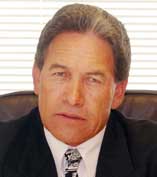 From what I saw of the coverage, it would appear that Winston's accusations are, in fact, to as much of an extent as the statements of such a man can be, justified. As Winston has been quick to point out since arriving home, consumers of the media in New Zealand received no real reports as to what exactly went on in the meetings, with none of journalists having actually attended them at all. Most of what was broadcast by both television networks seemed to focus on Winston's inexperience in his new position, making a special concerted effort to highlight awkward moments.
From what I saw of the coverage, it would appear that Winston's accusations are, in fact, to as much of an extent as the statements of such a man can be, justified. As Winston has been quick to point out since arriving home, consumers of the media in New Zealand received no real reports as to what exactly went on in the meetings, with none of journalists having actually attended them at all. Most of what was broadcast by both television networks seemed to focus on Winston's inexperience in his new position, making a special concerted effort to highlight awkward moments.
For example, when Winston first met with the Chinese Foreign Minister Li Zhaoxing, he took to barely-visibly shaking his counterpart's hand -- on the side of his body that was facing away from the cameras -- whilst clutching his briefcase in the hand that was closest to the reporters. When Zhaoxing discretely broke it to Winston that they needed to pose for the media as opposed to pretend that they were not there, Winston hurriedly put his briefcase aside and whipped around to smile crookedly at the cameras whilst slightly over-enthusiastically shaking Zhaoxing's hand.
These are the sorts of moments that observers in New Zealand were exposed to, as opposed to the real political content of the forum that should undoubtedly have been rendered of higher importance. A big deal was made and a degree of surprise issued from all quarters when, last week, it was heard that Winston had made statements in Korea that could possibly be construed as not anti-Asian. However, in the end, the consequences of those statements were not made known to the New Zealand public because of the media's intention to focus on Winston's ineptness.
It felt somewhat as if the media were making a concerted effort to paint Winston as some kind of excitable child. They placed liberal emphasis upon the fact that he had claimed he was eager to have a meeting with the United States Secretary of State Condoleeza Rice, apparently trying to put across the impression that he idolised her. The amount of media attention accorded to this aspect of the trip could certainly give some people the idea that meeting Condoleeza Rice was Winston's own primary purpose of being in attendance at the Apec forum. The fact that she is a representative of the United States could be made to serve to suggest that Winston was not going about government business whilst in Korea, but rather Winston business.
This is, of course, certainly not the first time that Winston has taken a dig at the media for their alleged attempts to create significant spin against him. The most recent previous occasion was when New Zealand First entered into the coalition with Labour under Winston's leadership. He was widely denounced in the media for retreating on his election promises for the sake of securing the perks of a ministerial job; perks that he has now experienced the first of in meeting Condoleeza Rice. However, it could perhaps be said that this time around, his complaints against the media are more justified than ever. As has been said, it would appear that many journalists have the distinct intention of making Winston fail at his role of foreign minister. It was noted that, following prior reporting that Winston was going to address his acceptance of the ministerial post at a New Zealand First Party conference yesterday, he skirted the issue altogether in the end for the alleged reason of not "being subsumed" by the past. The prediction that he was going to focus heavily on what he sees as the flawed nature of the media's reporting was proved correct, however, with Winston going as far as to accuse the Herald of treason. The Herald had, allegedly incorrectly, read his friendly interactions with Condoleeza Rice as an attempt to strengthen ties between New Zealand and the United States.
It was noted that, following prior reporting that Winston was going to address his acceptance of the ministerial post at a New Zealand First Party conference yesterday, he skirted the issue altogether in the end for the alleged reason of not "being subsumed" by the past. The prediction that he was going to focus heavily on what he sees as the flawed nature of the media's reporting was proved correct, however, with Winston going as far as to accuse the Herald of treason. The Herald had, allegedly incorrectly, read his friendly interactions with Condoleeza Rice as an attempt to strengthen ties between New Zealand and the United States.
Overall, however, thanks to Winston's omission of certain undesirable topics at the conference, such as the manner in which he played the electorate during New Zealand First's election campaign, things seem to be looking up for Winston in terms of his support base, with it having been said that he received significant statements of support at the conference for his decision to enter into a coalition with the Labour Party. He also provided the assurance that he is not, in fact, as many have speculated, going to retire at the end of this Parliamentary term. There now appears to be the potential that Winston will be around for quite a while yet.
 Winston's defences of his own integrity upon his return to New Zealand were reinforced by Helen Clark who allegedly commented that he had made a "pretty good effort" whilst at the overseas engagements, and that also he has made a concerted attempt to further New Zealand's interests, particularly in terms of the potential vulnerability of it and other small nations to terrorist attacks given that they have only small military forces. Winston at least recognises the potential benefits for New Zealand that come from its being a part of the British Commonwealth and at the conference he admirably made attempts to reap them.
Winston's defences of his own integrity upon his return to New Zealand were reinforced by Helen Clark who allegedly commented that he had made a "pretty good effort" whilst at the overseas engagements, and that also he has made a concerted attempt to further New Zealand's interests, particularly in terms of the potential vulnerability of it and other small nations to terrorist attacks given that they have only small military forces. Winston at least recognises the potential benefits for New Zealand that come from its being a part of the British Commonwealth and at the conference he admirably made attempts to reap them.